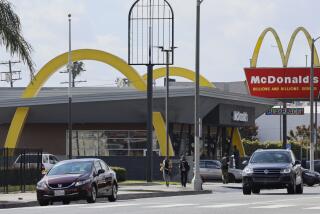California cracks down on wage theft by employers

State regulators are wielding a new tool to combat the intractable problem of employer wage theft, which costs workers an estimated $390 million a year.
The California controller, working with the state labor commissioner, is demanding restitution from suspected violators — and filing lawsuits, if necessary — under California’s Unclaimed Property Law.
“We’re using a 55-year-old statute to compel immediate payment from unscrupulous businesses that have fleeced their employees of earned wages for years,” state Controller John Chiang said at a news conference in Fresno on Thursday.
Chiang has ordered a pair of firms, identified in a pilot project, to transfer any wages that have gone unpaid for more than a year to the state treasury. Then, the controller’s office can look for the recipients and pay them their overdue money.
As part of his “Operation Pay-Up,” Chiang and supporters highlighted the case of a Fresno company that Chiang says has not complied with a court order to pay $247,600 in back pay to 59 workers. The company, being sued by the state, makes feed for poultry and other animals and has operated under the name of Fresno Protein Processors Inc., Apple Valley Farms Inc. and Valley Protein Inc.
The controller also is suing a Los Angeles business, All-American Pet Co., which makes nutritional products for dogs, accusing it of failing to comply with an agreement to pay $15,600 in back wages to a single employee. Both defendants are faced with hefty interest bills and $50,000 fines.
The controller’s office said a third company, the Far East Cafe in Los Angeles’ Little Tokyo neighborhood, recently paid a $41,113 judgment in favor of a former employee after being contacted by the state.
The state’s action is bringing new hope to workers in low-paid, often-dangerous jobs, said Noemi Carreño, who deboned chicken for five years at the Fresno plant and is owed $5,500.
“It was hard and unfair that they let me go without paying me or giving me an explanation,” she said. “I earned that pay, and the company took advantage of many of us.”
Executives at Valley Protein and All-American Pet Co. did not respond to requests for comment.
Wage theft, said California Labor Commissioner Julie Su, denies workers “their fundamental right to be paid a day’s pay for a hard day’s work.”
Emphasizing that point, Su and the state Department of Industrial Relations announced Thursday that the state had issued a legal citation against Spirit Airport Services.
An investigation revealed that the company owed wages to 182 former and current employees, who cleaned commercial planes at LAX. The company, whose phone is disconnected, owes $853,384 in back wages, damages and penalties because it required cleaners to work off the clock when planes were delayed, the department said.
Wage theft by a minority of employers is bad for all law-abiding businesses, said California Labor Federation Executive Director Art Pulaski, because it hurts “responsible employers who are playing by the rules.”
Wage theft is a major part of California’s so-called underground economy. The widespread phenomenon, experts say, involves cash payments for goods, services and labor that deprives the state and local governments of an estimated $7 billion a year in tax revenue, according to 2011 legislative research report.
More than a quarter of workers in Los Angeles County get paid in cash, the Economic Roundtable, a Los Angeles research organization, has estimated.
Collecting back pay for low-wage workers has never been easy. State regulators and advocates for the working poor say they manage to capture an average of only 17 cents on the dollar in lost wages because scofflaw employers change their names and business licenses, close up shop or simply disappear.
Chiang’s new initiative, though on a small scale for now, sends a message to employers that they need to pay workers what they’ve earned, said Tia Koonse, a researcher at the UCLA Labor Center.
“Our research shows that for every successful case, four more workers hold court orders who won’t see a dime,” she said.
“The state needs simpler remedies to ensure workers receive every dollar they’ve earned.”
Twitter: @MarcLifsher







